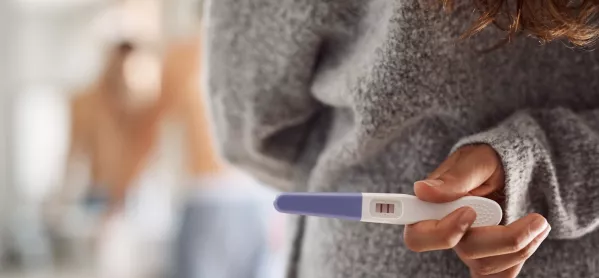- Home
- Schools to play key role in reducing teen pregnancies
Schools to play key role in reducing teen pregnancies

The rate of teenage pregnancies in Scotland is at its lowest since 1994, according to statistics published today.
And it is believed that schools will have to play a key role if that trend is to continue, with longitudinal data showing that pregnant teenagers garner fewer qualifications than their peers.
In 2017, there were 30.2 teenage pregnancies per 1,000 women, down from 31.7 in 2016 and 54.7 in 1994. Teenage pregnancy rates for those living in the most-deprived areas decreased from 93.7 to 56.0 per 1,000 between 1994 and 2017, and for those in the least-deprived areas from 23.4 to 11.5 per 1,000.
How much have things improved? 2013 inquiry criticised ‘inconsistent’ sex education
Sex education: New guidance for teaching about consent
Personal and social education: PSE must be ‘vastly improved’, says review
Teenage pregnancy: ‘Schools should teach girls how and when to get pregnant,’ say doctors
The new figures, published this morning, mark the 10th consecutive year that the teenage pregnancy rate has fallen.
Scotland plans to offer more support to pregnant teenage girls in an attempt to keep them in education, with details highlighted in the second progress report for Scotland’s Pregnancy and Parenthood in Young People Strategy.
Pregnancy and education
The report states: “It is our ambition that no young woman has to leave education, training or employment as a direct consequence of a pregnancy.”
The progress report - published last Thursday - notes that the 2018-19 Programme for Government points to links between adverse childhood experiences (ACEs) and “an increased likelihood of early sex and teenage pregnancy”. It also advises that ways of tackling “the negative impact of ACEs” should include school counselling services, support for children affected by domestic abuse, better contact between parents in prison and their children, and improved “health and wellbeing support” for children in schools.
The new progress report states: “Evidence shows that education and engagement with learning are key interventions which help young people to plan for their future - including pregnancy and parenthood. Poor attendance at school, low attainment or achievement, few or no aspirations and free school meals entitlement are key indicators for risk of teenage pregnancy.”
The report claims that the £750 million earmarked during the course of the current Scottish Parliament to tackle the disadvantage attainment gap “will have a real impact on engaging young people with education and learning, providing a key intervention for reducing the risk of pregnancy at a young age”.
It adds that local authorities should come up with “guidance for schools to ensure that support and planning processes are in place to allow young people who become pregnant to remain in their own school”.
The longitudinal Growing Up in Scotland study has found that mothers aged younger than 20 when their first child was born were less likely to have a qualification at Higher grade or above and more likely to be reliant on welfare benefits and tax credits than older mothers.
Helping young parents to stay in education “has the potential to increase their opportunities for employment and future earnings, increasing future life choices”, says the new progress report.
Work is ongoing on new guidance for supporting young pregnant women and young parents to remain in school, and Health Scotland is working on an evidence briefing on what helps young parents to stay in education, to be published later this year.
Following on from the publication of key messages for young people on consent, work has also started on “age- and stage-appropriate key messages on healthy relationships and consent for professionals caring for and educating early stage and primary-aged children”.
Public health minister Joe FitzPatrick said today: “It is encouraging to see a fall in the rates of teenage pregnancy for the tenth successive year.
“This reduction means rates are the lowest since monitoring began in 1994. I’m particularly pleased that the gap in teenage pregnancy rates between the most and least deprived areas is narrowing, too.
“We have taken significant action in this area and are working with partners to further support young people around both pregnancy and parenthood.”
Meanwhile, the Rape Crisis Sexual Violence Prevention Programme is receiving government funding to go to secondary schools in all 32 local authorities. It covers gender, consent, sexual violence, sexualisation and pornography, social media, the impact of sexual violence and how to access support. The pilot project will be evaluated by the University of Glasgow.
In a recent review of PSE, professionals and young people were asked how the issue of sexual consent is taught within relationships, sexual health and parenthood (RSHP) education from early learning through all levels of school education - in an age- and stage-appropriate way.
In January, the Scottish government said it was committed to reviewing and updating the statutory teaching guidance on RSHP, and that that “elements of RSHP and PSE (personal and social education) should be standardised and delivered consistently across Scotland”.
Keep reading for just £1 per month
You've reached your limit of free articles this month. Subscribe for £1 per month for three months and get:
- Unlimited access to all Tes magazine content
- Exclusive subscriber-only stories
- Award-winning email newsletters



